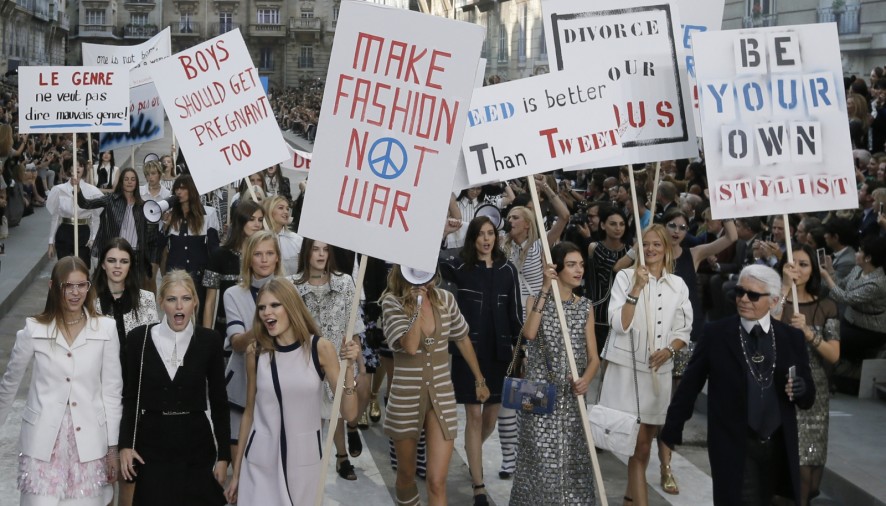Although not often obviously linked, fashion and feminism undoubtedly influence each other. While it has been widely argued that fashion perpetuates the idea of appearance being of highest value to women there has been a recent shift in the attitudes of designers and workers in the industry. The discussion of empowerment over objectification has started to collapse the idea of fashion and feminism being fatally incompatible.
 A common perception drawn when considering the ‘is fashion feminist?’ question is that the fashion industry as a whole objectifies women. While historically this bears some truth, this isn’t necessarily the case today. Many critics believed Rick Owens to be objectifying women in his SS16 show where women were carrying women down the catwalk. There was heavy criticism of Owens with the women being likened to the newest accessory, however his statement after the show provided illumination on his thinking. “Straps can be about restraint but here they are all about support and cradling. Straps here become loving ribbon”. He stated that the main message of the show was “women raising women, women becoming women and women supporting women. ”This marks a definitive shift in designer thinking away from the past where fashion houses such as Chanel (with Lagerfeld’s faux demonstrations proclaiming “history is her story”) have been accused of using feminism as a marketing technique to fit with the zeitgeist of third-wave feminism.
A common perception drawn when considering the ‘is fashion feminist?’ question is that the fashion industry as a whole objectifies women. While historically this bears some truth, this isn’t necessarily the case today. Many critics believed Rick Owens to be objectifying women in his SS16 show where women were carrying women down the catwalk. There was heavy criticism of Owens with the women being likened to the newest accessory, however his statement after the show provided illumination on his thinking. “Straps can be about restraint but here they are all about support and cradling. Straps here become loving ribbon”. He stated that the main message of the show was “women raising women, women becoming women and women supporting women. ”This marks a definitive shift in designer thinking away from the past where fashion houses such as Chanel (with Lagerfeld’s faux demonstrations proclaiming “history is her story”) have been accused of using feminism as a marketing technique to fit with the zeitgeist of third-wave feminism.
The phrase “the personal is political” was popularly used throughout second-wave feminism as a direct challenge of the nuclear family and the traditional roles of women. It also has the meaning of everyday individualism creating powerful statements which can be directly applied to fashion. Women choose what they wear everyday which in itself is empowering and constructs a statement of individual liberty that goes beyond the image of women as visual objects. With the progression of third-wave feminism, style has become a significant means of expression.
Away from its face image, fashion is starting to be used as a tool for making progression within the feminist agenda. In the last few years fashion brands aiming to create a social impact and improve the lives of women have been on the rise. One example is the aid of an online site called Fashion compassion which brings small brands to a bigger market than they would otherwise be able to reach. In 2014, the fashion brand Palestyle (which aims to provide money and jobs for female Palestinian refugees in the Lebanon and Jordan camps) joined with the market website and is having a considerable impact on the lives of the women who work there.
Whilst the debate surrounding fashion being feminist has compelling arguments against and we must recognise a difficult history, fashion and feminism aren’t fatally incompatible. Significantly, fashion remains to be the most female dominated industry. There is a huge potential to increase awareness of feminist issues through fashion and reach out to women with both aid and empowerment.
Victoria Copeland
Images: ibtimes, Getty Images

